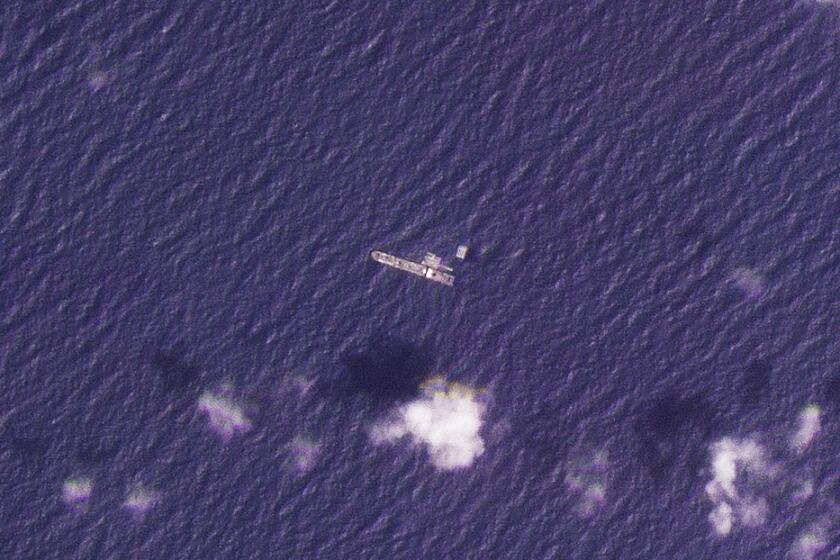Liberians Jam Polling Places to Cast Ballots for President
Polling booths across Liberia were supposed to open at 8 in the morning Tuesday. But Liberians by the thousands lined up as early as 2 a.m., eager to vote in the first elections since President Charles Taylor was forced from office in 2003.
Some polling stations opened an hour or two late. For most voters the blistering sun was high in the sky before they got to dip a finger in ink and mark the ballot with a fingerprint or a cross, joining in democratic elections that were free of fear and violence but at times disorganized.
At Saint Martin Lutheran Church in Red Light, a crowded and poverty-stricken neighborhood named for the first traffic light in one of Monrovia’s suburbs, hundreds of sweating voters crushed against the gates of the polling station waving their voter registration cards and complaining about the poor organization. Inside, booths were almost empty of voters and few votes had been cast by midday.
A Nigerian soldier serving with a U.N. peacekeeping force here resolved the disorder by surging into the crowd, hitting voters sharply on the head with a wooden stick and shouting at them to “Get back! Give chance!”
There were no exit polls Tuesday, and official results are not due for several days. With 22 candidates for president, none is likely to garner the more than 50% required to win outright, analysts believe. Former soccer star George Weah, 39, and former World Bank official Ellen Johnson-Sirleaf, 66, are widely expected to top the balloting and go on to a runoff next month.
Voters also were electing a 30-seat Senate and 64-seat House of Representatives. Many parties, including Weah’s Congress for Democratic Change, Johnson-Sirleaf’s Unity Party and the exiled Taylor’s National Patriotic Party, are scrambling for control of the legislature.
Mike McGovern, project director on West Africa for the analytical International Crisis Group said a poor showing in parliament by the incoming president’s party would make it more difficult for him or her to govern, but under Liberia’s system the balance of power was strongly skewed toward the president.
Late Tuesday, the chairwoman of the national electoral commission, Frances Johnson-Morris, said the voting had been “relatively free and fair.”
After 14 years of civil wars that ended in 2003, many Liberians see the elections as a momentous step toward stability and peace. That feeling was summed up in one election billboard outside Monrovia, the capital: “It could kill us or liberate us. Vote wisely.”
Paul Risley, spokesman for the U.N. peacekeepers, said there had been a large turnout and that voting was peaceful with few disruptions.
“If anything we are concerned by the slow process of voting,” he said, adding that balloting had gone at about half the expected speed. It continued after nightfall in some areas. “Today more Liberians will have voted than ever before, and this one will be the most representative. There was overwhelming support for the process and for democracy.”
More than 200,000 of Liberia’s 3.3 million people died in the civil wars, with civilians suffering atrocities at the hands of fighters, many of them child soldiers often addled by drugs and alcohol.
Roland Porter, 61, a janitor voting Tuesday, said Liberians had been suffering too long under poor leadership and wars.
“I’m not voting for my own personal interests but for my great-grandchildren. I’ll be gone because I don’t have long to live now,” said Porter, in a country where average life expectancy is 48 years. “I don’t want my great-grandchildren to suffer. I want them to live a better life.”
Moses Sonyeh, a former soldier in Taylor’s forces who lost a leg when a rocket exploded during the 2003 battle for the capital, known here as “World War III,” had been waiting five hours in line to vote at the Antoinette Tubman football stadium in central Monrovia.
“The most important thing for the new government to do for us is that we are all war-affected,” he said. “So many people died in the war. Every day we are begging in the streets for something to eat.
“We want the new government to do something for us so that we have got something to do, not just begging,” he said.
At Red Light -- where the famous traffic light installed in the 1980s still hangs over an intersection, although long out of order -- many young men emerged from polling booths saying they voted for Weah, a populist high school dropout.
Johnson-Sirleaf, a Harvard-educated economist, appeared popular among women in the district.
She would be the first elected female president in Africa if victorious.
Formatta Jones, a 41-year-old mother of seven, voted for Johnson-Sirleaf.
“I think about my children’s education, and we want peace in the nation. I vote for Ellie because she’s a woman and she wants unity,” she said.
Yatta Russell, 23, said if Liberians voted for the right person the country would live in peace. “If it’s the wrong person, there will be plenty war. We’ll suffer a lot -- no food, no water to drink,” said the mother of two, who also voted for Johnson-Sirleaf.
Bayboy Velea, 25, unemployed, voted for Weah’s party in the hope it would give him a free education.
Another Weah voter, Kormah Guwor, 32, also from Red Light, said: “I think he will deliver me from my suffering.”
More to Read
Start your day right
Sign up for Essential California for news, features and recommendations from the L.A. Times and beyond in your inbox six days a week.
You may occasionally receive promotional content from the Los Angeles Times.






